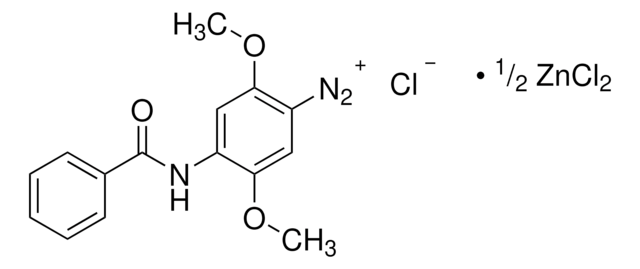L0294
Luxol® fast blue solution
liquid
Sinónimos:
Solvent blue 38
About This Item
Productos recomendados
product name
Luxol® fast blue solution, 1%
form
liquid
concentration
1%
density
0.800 g/cm3
application(s)
diagnostic assay manufacturing
hematology
histology
storage temp.
room temp
Categorías relacionadas
General description
Application
Legal Information
signalword
Danger
hcodes
Hazard Classifications
Eye Irrit. 2 - Flam. Liq. 2 - STOT SE 2
target_organs
Eyes,Central nervous system
Storage Class
3 - Flammable liquids
wgk_germany
WGK 2
flash_point_f
57.2 °F - closed cup
flash_point_c
14.0 °C - closed cup
ppe
dust mask type N95 (US), Eyeshields, Faceshields, Gloves
Certificados de análisis (COA)
Busque Certificados de análisis (COA) introduciendo el número de lote del producto. Los números de lote se encuentran en la etiqueta del producto después de las palabras «Lot» o «Batch»
¿Ya tiene este producto?
Encuentre la documentación para los productos que ha comprado recientemente en la Biblioteca de documentos.
Los clientes también vieron
Nuestro equipo de científicos tiene experiencia en todas las áreas de investigación: Ciencias de la vida, Ciencia de los materiales, Síntesis química, Cromatografía, Analítica y muchas otras.
Póngase en contacto con el Servicio técnico












